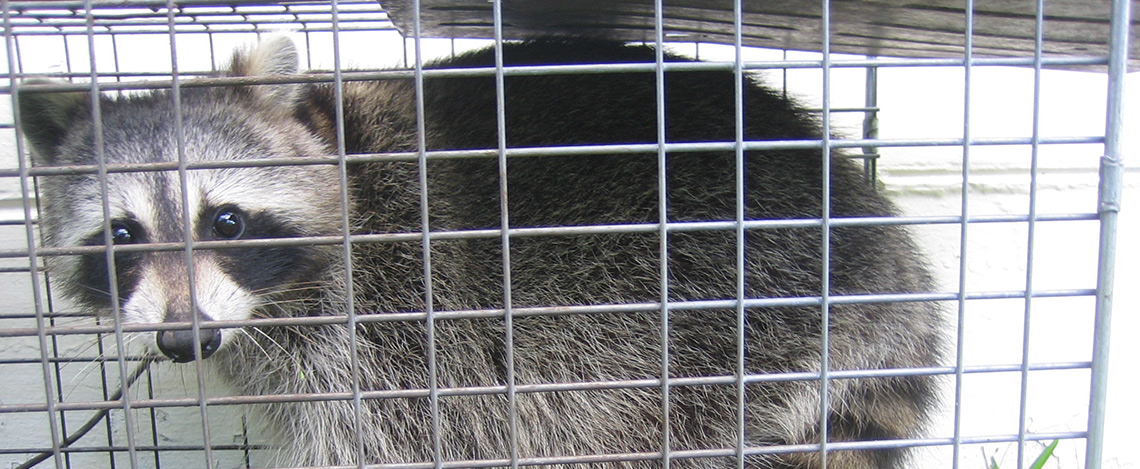Raccoon Removal - How to Get Rid of Raccoons
Raccoons - Problems They Cause, Methods of Removal and Prevention: Raccoons have spread all across North America, except from those areas with extremely dry desert or extremely high mountains. So, if your house is in an urban or suburban setting where it's not unbearably hot or unbearably cold, and you haven't had a raccoon problem so far, you're one of the few lucky ones. Because you are on this page, however, I don't imagine that to be the case. The urban coon is a highly intelligent animal, with an innate skillset that allows it to thrive alongside people and manmade structures. It will go through great lengths to achieve its goals, and this means it will cause lots of problems and damage if it ever has the opportunity to set camp in your attic, your chimney, or under your shed or porch. About what these problems are specifically, and about how you can deal with them, or how you can try to avoid having to deal with them through prevention, you can continue reading in what follows.

Problems raccoons can cause
First of all, raccoons carry diseases that are contractible by humans and other animals either by direct or indirect contact. They carry rabies and parasitic worms. Raccoon roundworm is the most feared and most frequent disease humans can catch if they breathe in dust particles that have been contaminated with roundworm eggs from the raccoon's feces, and can be fatal or lead to neurological problems if undetected and untreated. Raccoons can also transmit leptospirosis through their urine, and their feces may also be infected with the giardia parasite. So, yes, they may be smart and cute-looking, but they present a major health risk for those who have to share living spaces with them, or those who choose to tolerate them in their homes or on their properties.
Raccoon Damage
Moving on to the next aspect on the list, there are two instances in which we can talk about raccoon damage. The first one is when a raccoon or family of raccoons stops by to feed on your property. Raccoons have different feeding stations throughout their respective territories, and will keep to a schedule in order to always have their bellies full. This means that an individual, separate individuals, or a mother with cubs could visit your property for a quick bite every night, every second night, once every two weeks – no matter how often, if it found a food source there, you can bet it won't be a one-time thing. This means that they will try to find even more food there, destroying whatever stands in their way, turning stuff over, breaking objects, leaving their droppings behind, causing a whole lot of racket in the meantime. Their passing through will eventually attract other individuals which will continue to add to this sort of damage. Coons are also very fond of the insects, grubs and worms from underneath your lawn, and they will very easily tear up sod to get their share of the good stuff. This is a problem particularly when you've just laid new sod. Raccoons are drawn to water by genetic coding, so they may contaminate your pool, or eat your fish if you have a fishpond outside. Additionally, there's always the chance that they really like what they see and decide there's also room for shelter there, not only for food. And this leads to the second instance in which raccoon damage can be very problematic for homeowners.
Raccoons in Attic
If you've seen a raccoon getting in and out of your attic or chimney – the most common places the urban raccoon will try to nest in – the typical case is that you're dealing with a mother raccoon that is raising a litter in there, or with a soon-to-be mother raccoon that is preparing her nest. You might also be dealing with several related or unrelated raccoons who seek shelter during wintertime and will stay together in an attic when weather is at its coldest. This is applicable to northern areas with harsh winters. Otherwise, like I said, it's a female raccoon with its young. This means that the raccoon has made its way through possibly by causing structural damage to your roof, if it didn't have an access point available. It will contaminate the attic with its droppings and urine, and it will stomp on insulation weakening the attic floor. It will make sounds and noises while thumping and scratching around in the attic, and that might keep you up all night if you're not a heavy sleeper. The young will chitter in a distinctive manner which will also be annoying and disturbing.
Methods of removal and prevention
The best removal method when talking about raccoons is by using a live cage trap. Now, there are tons of variables here, and chances are that it will take several tries for you to trap the raccoon. My go-to method is to first find the litter, and then use one or two babies as bait. The mother raccoon will make her entrance soon enough, and will try to retrieve its young, getting trapped herself in the process. You can also use a professional snare pole to catch the raccoon either directly, or by chasing the raccoon with the snare pole into the cage. It may sound simple, but beginner trappers will surely find out that it's not. Any other methods of removal have the potential of being particularly problematic, and you should never try and remove a raccoon that lives on your property without making sure that there's absolutely no chance of a litter being left behind to starve to death. Raccoons are strong and will defend themselves by biting and clawing, so make sure you use protective gear and take proper safety measures. A very big part of proper wildlife removal is decontamination and repair. It is highly important that you don't skip these final steps, and that you perform them correctly. It would be a real shame if after succeeding in removing the troublemakers, you end up getting sick because of poor cleanup, or if you have to go through all that hassle again in a couple of months because you haven't sealed shut all the possible raccoon points of access to your attic. To be clear, I do not recommend that you try and tackle this problem yourself if you don't have experience in trapping wildlife, as this is not a safe activity, and improper practice in both removal and disposal/relocation may lead to more issues for both you and the animal. A certified wildlife control professional should always be your first choice. If you would prefer to handle the problem yourself, I recommend you at least contact a pro to help you out with advice and tips.
Raccoon prevention
Highly opportunistic and invasive, raccoons will come bother you if you're offering them either food or shelter. To restrict their access to food sources on your property, you should properly secure your trashcans, and keep them in the garage, or somewhere else inside if possible. Remember, coons are intelligent and dexterous, so securing the cans means really securing them with a lock or locking system, not just putting a rock on the top. You should also make sure that pet food or farm animal food is not left outside after the animal is done eating, not even during the day. If raccoons are raiding your birdfeeders, equip the feeder pole with a steel raccoon baffle (your standard squirrel baffle won't be big enough), and don't leave the feeder out at night. If raccoons are feasting in your garden, install solid fences that are high enough and deep enough so that the animal can't make its way through by digging or climbing, both sports at which the raccoon excels (some prefer electrical fences). If raccoons are tearing up fresh sod, you can install a protective net over it until the roots take in and you don't have to water it so much. Make sure you pick up any fallen fruits or nuts that might get the raccoon's attention. Taking preventive measures is wildlife damage management 101. If it's already too late for prevention, make sure you consult with a pro, and start putting all the prevention methods in place as soon as the problem is solved.

Raccoon Removal - How to Get Rid of Raccoons
Do Raccoons Attack People?
About Raccoon: Appearance, biology, life cycle, habitat, diet, behavior
What to do if you are bitten by a raccoon
Do Raccoons Climb Fences?
Do Raccoons Come Out In the Rain?
Do Raccoons Eat Mice/ Rats?
Can raccoons open doors or windows?
Can Raccoons Jump Onto Houses Or Over Fences?
Do Raccoons Live In Trees and Sleep In Trees?
Do raccoons swim?
Do Raccoons Hibernate?
Do Raccoons Burrow or Dig Holes?
Do Raccoons Attack Cats, Dogs, or Other Pets
What attracts raccoons?
How big do raccoons get?
What does raccoon feces look like? Where is it found?
How to get rid of raccoons in the attic
Do Raccoons Use Tools?
Do Raccoons Live and Travel in Packs?
Are raccoons dangerous to cats, dogs, or other pets?
How to identify raccoon tracks
How smart are raccoons?
What Kind of Damage do Raccoons Cause in Attic?
What Is Raccoon Roundworm?
What Should I Do With Raccoon After I Catch It?
Is Raccoon Feces Dangerous To Touch Or Breath?
What Disease Do Raccoons Carry?
Should I Feed A Baby Raccoon I Found?
What to Do About Raccoons on the Roof
What to Do About Raccoons under the Porch
What Should I Do If I Find an Orphaned Baby Raccoon Wandering About?
Do Raccoons Make Good Pet?
What Are Some Ways to Kill Raccoons in the Yard?
Where Should I Relocate A Trapped Raccoon?
What Do Wildlife Rehabilitators Do With Raccoons?
What Are Some Humane Way To Kill Raccoon In A Cage?
Should I Ever Poison Raccoon?
Is Raccoon That Is Active During The Day Rabid?
What Are Some Of The Symptoms Of A Sick Raccoon?
How Can I Clean Raccoon Feces Out Of My Attic?
About Raccoons: Appearance, biology, life cycle, habitat, diet, behavior
How to get raccoons out of the attic?
How to keep raccoons away from your property
Is it legal for me to trap a raccoon?
How to get raccoons out of the chimney?
How do you know if you have a raccoon in your attic?
Do mothballs or ammonia help repel raccoons?
Will repellents get a raccoon out of the attic?
Will a Pest Control Company Remove a Raccoon?
Will a raccoon in the attic have a nest of babies?
What is raccoon eviction fluid?
How to Get Raccoons Out Of a Wall?
Is It Good To Handle Raccoon With Bare Hand?
What is the best bait to trap a raccoon?
What if a raccoon got inside my house, bedroom, kitchen, etc.
How to keep raccoons out of your house?
Will repellents get a raccoon out of the chimney?
What to do about a cage-shy raccoon
Will the City or County Animal Services help me with Raccoon Issue?
How to Find and Remove a Dead Raccoon
What equipment is needed to trap a raccoon?
How do I know if there are baby raccoons in the attic?
Will Homeowners Insurance Pay for Raccoon Damage?
How to keep raccoons out from under a shed or porch
Do More Raccoons Live In Urban Areas or Wild Areas?
What Is Raccoons Natural Diet
What Is a Raccoon Mating Habit?
How to Remove Raccoon from Dumpster
How to Keep Raccoons Out Of My Garbage Cans?
How to Keep Raccoons Out Of My Garden
How to Keep Raccoons Out Of My Bird Feeders
How to Keep Raccoons Out Of a Chicken Coop
How to Prevent Raccoons from Pooping In My Swimming Pool
Should I Hire a Pro or Remove Raccoon Myself

